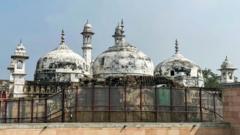India's Supreme Court is currently examining a series of petitions that question the constitutionality of the Places of Worship (Special Provisions) Act of 1991. This law aims to protect the character and identity of religious places as they existed at the time of India's independence in 1947. Under this law, the conversion or alteration of religious sites is prohibited, and courts cannot adjudicate disputes over their status, apart from the notable exemption of the Babri Masjid case.
The Babri Masjid, a 16th-century mosque, has been at the center of a historic dispute that escalated to its demolition by a Hindu mob in 1992. This incident highlighted deep-rooted sectarian tensions in India and culminated in a Supreme Court verdict in 2019, which allocated the disputed land for the construction of a temple, intensifying discussions around India's religious and secular fabric.
The petitions currently before the Supreme Court, one of which is led by a member of Prime Minister Narendra Modi's Bharatiya Janata Party (BJP), contend that the 1991 law violates religious freedoms and constitutional secularism. This legal challenge emerges amid a wave of claims from Hindu groups asserting that many mosques were built over demolished temples, reigniting the specter of communal strife.
Defenders of the law, including opposing party leaders and Muslim communities, argue that it is a vital safeguard for the religious identities of minorities within India's Hindu-majority setting. They voice concerns that any alteration or nullification of this law could lead to an avalanche of challenges against various religious structures, heightening the potential for violence and unrest.
Recently, the Supreme Court has restrained lower courts from accepting new petitions related to the ownership of religious sites while the current case is deliberated, with the next hearing scheduled for February.
The rationale for enacting the 1991 law stemmed from a period when rising Hindu nationalist sentiments were leading to violent incidents across the country. The then-home minister, SB Chavan, expressed that the legislation aimed to curb intolerance and prevent forced conversions of religious sites—an effort to foster communal harmony during turbulent times.
Despite these intentions, the BJP opposed the law vigorously, fearing it would exacerbate Hindu-Muslim tensions rather than resolve them. Critics of the law have raised alarms regarding recent admissions of petitions challenging revered religious sites, such as the Ajmer Sharif dargah, and the ensuing violence in Sambhal, where deadly clashes erupted over surveys of historic mosques.
The legal landscape surrounding the Places of Worship Act is fraught with complexity, and as the Supreme Court weighs its implications, many are left wondering about the future of communal harmony in a nation often defined by its rich tapestry of religious diversity.




















